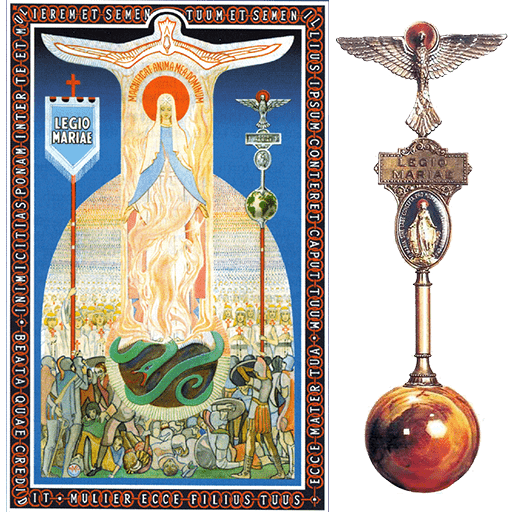St. Peter and the Legion - February 2013
By Fr. Bede McGregor OP
Spiritual Director to the Legion of Mary
Since the feast of Our Lady of Lourdes, the day on which Pope Benedict XVI announced that he will relinquish his Office as the Successor of St. Peter, I have been thinking of St. Peter a great deal and how blessed we have been in having such tremendous successors of the great apostle in modern times. These special days led me to reflect on St. Peter and his place in Legion spirituality.
We ask for the intercession of St. Peter at all our Legion meetings but there is much more than a simple invocation behind the place of Peter in the Legion. There is a rich vein of spirituality to be found in the New Testament account of the place of Peter in the life of Christ and the early Church. It is surely significant that he is mentioned by name 191 times in the New Testament which is more often than all the other apostles put together.
The Handbook puts the reason why St. Peter is one of the Patrons of the Legion very succinctly: ‘In invoking St. Peter, we express once again a Legion’s loyalty to Rome, the centre of our faith, the source of authority, discipline, unity.’ It is unthinkable that St. Peter would not be a key figure and focus in the spiritual ethos of the Legion.
Today I wish to focus on three questions that Our Lord put to St. Peter and which He puts to each one of us too. First, at Caesarea Philippi he asks: ‘Who do you say that I am?’ That is the foundational question in the New Testament and for our own personal history and the history of the world. Peter answers: ‘You are the Christ the Son of the Living God.’ That is the faith of every disciple of Jesus and the rock on which the Church is built and of course the mainstay of the Legion. That is the virtue which was so fundamental to Mary: ‘Blessed is she who believed.’ It is the gift that every legionary asks for and keeps on asking for from God and Mary. Mary leads us to faith in Jesus, true God and true man. Jesus is not someone we just fit into our lives as best we can; He is not just one figure in our lives among many others; No; He must be at the very centre of our lives, the one around whom everything else revolves. Faith cannot be compartmentalised into practice only at certain times or places but must animate the whole of our personal existence.
The second question Our Lord puts to Peter is: ‘Why did you doubt?’ You know the story well. The apostles were having a tough time at sea when Our Lord appeared to them walking on the water. They were terrified thinking it might be a ghost. But Peter spoke up: ‘Lord if it is you bid me to come to you across the water.’ And Jesus says: ‘Come!’ And Peter walks on the water but takes his eye off Jesus and panics and begins to sink. Jesus rescues him and puts to him the radical question that is also addressed to you and me: ‘Why did you doubt?’ Jesus is the Lord even of the humanly impossible and asks us for absolute trust in Him. Mary was told by Gabriel that nothing is impossible to God and she believes that and becomes the exemplar of the theological virtue of hope. The Legion asks Mary for a share in her unconditional trust in God. It is good for us to remember especially in these days that the Church belongs to Christ and indeed is the Risen Christ living and acting in and through us his Mystical Body. We have no reason to fear or doubt. We are called to be people of unconditional hope and joy in Christ no matter how difficult our circumstances may appear to be to us.
The third question that Jesus puts to Peter comes poignantly from the depths of his Sacred Heart: ‘Do you love Me?’ This question is so important that Our Lord asks it three times of Peter. This conversation between Jesus and Peter is one of the most moving dialogues in the New Testament. Our Lord is making a supremely important point: before Peter can feed the lambs and sheep he must love Jesus and truly love the Church. Love must be the source and motive of all pastoral activity in the Church. The theological virtue of charity is the soul of every apostolate. Once more we see Mary as the exemplar of the virtue of charity. That is why the Legion treasures the title of Mary as the Immaculate Heart. She can be defined in terms of the utter selflessness of her maternal heart: her love for Jesus and we his brothers and sisters in his mystical Body.
Even in this very brief reflection on the message of the Gospel in the life of St. Peter we see the centrality of the theological virtues in the life of an authentic disciple of Jesus. These three virtues immerse us directly in the inner life of God the inner life of the Church in Christ. In the concluding prayer of the Tessera we pray for all three of these great gifts. They constitute the deepest life of the Legion. St. Peter intercede for all our legionaries throughout the world that they may truly live the great virtues of faith, hope and above all love.
*************************************
